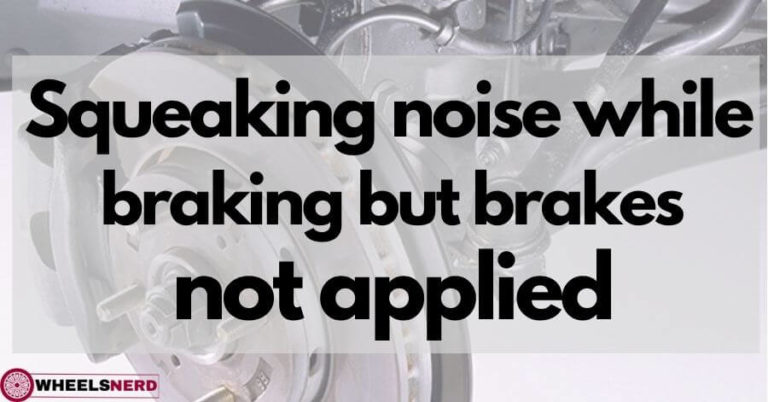The brake’s noise is not only annoying but can also be a warning sign of a dangerous situation. The most common cause is that the wear sensors on the brake pads are beginning to contact the brake rotors.
When the brakes are applied, it produces a screeching sound, which may change pitch or cease entirely after a while. It’s best to be safe and check your brake noises with a professional.
Changing brakes does not necessarily solve the squeaking problem because new brakes may also make noises. This article will describe the squeaking noise while driving without the brakes applied and how to eliminate them.
Reasons Why Your Brake is Squeaking

Two friction-material-lined brake pads compress a cast-iron disc in newly made cars. They connect to a disc, pads, and caliper. Also, these parts frequently pulse or vibrate. The brake squeal is due to a high-frequency vibration.
The rigidity and density of the pad and disc control the pitch. Thus, the car’s speed and the pressure on the left pedal will influence the sharpness of the sound.
Below are some factors causing your brakes to screech.
The Brake Pad Material:
It’s possible that the noise you’re hearing is coming from your car’s brake pads, not because something is wrong with them but because of their material.
Brake pads absorb a great deal of friction. Thus, they must have heat-resistant materials. Modern brake pads use Kevlar, ceramics, composite materials, and other equipment.
Although most brake pads contain some metal, low-quality pads have too much of it for your brakes to function effectively. This metal will start grinding loudly on your brakes’ rotors as it wears down, making annoying noises.
Lubrication Problems:
The shoe brake backing plate is a component of your brake system. For something to work effectively, it needs to be lubricated. You may hear squeaking from your rear brakes when you apply pressure to the brake pedal if the oil has run short.
The pedal scraping against the backing plate causes the screeching noise. You will get a buildup of rust if your lubrication isn’t working correctly, resulting in metal-on-metal squeaking.
Also Read: Creaking noise when braking at low speed? (Here is why)
Moisture:
Brake pads in most automobiles generate a grating or whooshing noise for the first few stops in the morning until they have warmed up enough to release any moisture accumulated overnight. It is normal and occurs due to dewdrops in the morning or rain.
Moisture getting into your brakes is one of the most prevalent reasons for squeaking. It is hard to escape having moisture in your brakes at some point. The noise is a nuisance, but it is not too concerning.
Trash and Dust:
Foreign substances can sometimes find their way into your brake assembly. You may wind up with grease and gunk surrounding your brake system, preventing them from working correctly.
This buildup prevents your brake pads and rotors from making proper contact to slow your car down. You may hear screeching, hissing, or squeaking as a reaction.
How to Prevent Brake Squeaking While Driving Normally?

One method for addressing brake noises is changing the pads to a different friction material. Upgrading to a premium metallic or ceramic pad may prevent the resonant frequency rattling of the pad and disc. It mutes the squeaky sounds.
Several gadgets promise to fix creaks at auto parts shops. However, these may not be appropriate. Brake squeaking can be due to a manufacturer’s lack of research. You can alter the resonance frequency, or the noise attenuated to solve this problem.
Following are some different ways to stop the screeching noises.
Cushions and Adhesives:
Teflon shims can isolate the piston from the pads acoustically. Teflon is a cushion designed to fit between the pad and the hydraulic pistons of the caliper.
When fixing the pads and fastening them up, use an anti-squeal adhesive. Anti-quell glue is anaerobic, which means it won’t stick till you press the brake pedal and expel the air.
While installing brake elements,
Appropriate Lubrication:
You cannot use general motor oil or WD-40 to lubricate the brakes. You need an anti-seize compound intended for extreme temperatures, like moly paste 60.
Before lubricating, check the connecting parts are free of road hazards or rust. Clean the sliding parts with a wire brush or a tool. After this, you can apply the lubricant to the back of the brake pads at the contact points of the brake pad shoe.
High-Quality Brake Pads:
The most crucial aspect of any brake pad is its quality and design. The noise could be a standard component of the pad, and it will keep happening as long as you use the same pads. The only option in this situation is to replace the brake pads, as the ones you have are inherently flawed.
When looking for new brake pads, you need to know the materials you need. Good material will help them do their job and be quiet when you use them. Organic materials such as resin, fiber, rubber, Kevlar, and composites of those materials are the ideal materials for brakes.
Conclusion:
The abrupt squeaking of your car can be startling and irritating. When there is an issue with your brakes, you should take it seriously. Taking chances with your brakes is never a good idea, so find out whether it is a simple problem like moisture in the brakes. Moisture will disappear sooner than more severe issues like failed brake pads or misaligned calipers.

